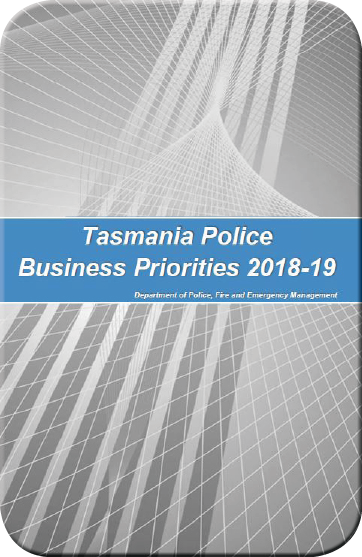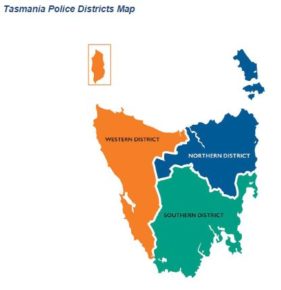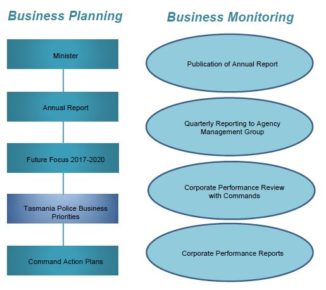>> Download in pdf format: DPFEM Business Priorities 2018-19

Tasmania Police values its responsibility in delivering quality policing services to the Tasmanian community. Ensuring Tasmania continues to be a safe place to live, work and visit is at the core of our activities and we are continually exploring ways to more effectively and efficiently serve the community.
The Tasmania Police Business Priorities 2018-19 details our main areas of focus for the year ahead. This document aligns with our strategic framework – Future Focus 2017-20 – with our overarching vision of a safe, secure and resilient Tasmania; and with the Government’s election commitments that sit with our Department.
Our priorities continue to focus on the Department’s four output groups of Public Safety; Crime; Traffic Policing; and Emergency Management. Within each of these output groups we will be concentrating our efforts to reduce offending and make Tasmania a safer place. This includes reviewing how we respond to youth offenders, targeting high-risk road behaviours and focussing on priority family violence perpetrators.
In response to the 2018 State Government election commitments, key priorities for Tasmania Police for the 2018-19 period include:
- Undertaking an analysis for workforce planning. This project will review our existing workforce and explore how we can be better resourced and distributed, to prepare for
the ever-changing environment we work in; - Supporting the construction and redesign of police stations;
- Investigating the uses of unmanned aerial vehicles to enhance policing and investigative capabilities; and
- Implementing the staged roll-out of body worn cameras.
Each Tasmania Police priority area is complemented by key focus areas. These identify how we will report against, and monitor our progress.
We look forward to undertaking the challenging agenda we have set for the year ahead and implementing the many projects, which will contribute to ensuring we have a contemporary
police service and a safer Tasmanian community.
D L Hine
Commissioner of Police
Tasmania Police
Tasmania Police is one of the operational arms of the Department of Police, Fire and Emergency Management. The Department’s other arms include the Tasmania Fire Service, State Emergency Service and Forensic Science Service Tasmania, with corporate support from Business and Executive Services.
Tasmania Police is responsible for delivering quality policing services in Tasmania. This is undertaken through three geographical districts – Northern, Western and Southern. Each District is overseen by a commander and supported by specialised support districts. Activities undertaken by Tasmania Police include high-visibility policing; criminal investigations including Specialist Support and Serious Organised Crimes Unit operations; developing targeted initiatives; counter terrorism; emergency management; and working in partnership with other Australian jurisdictions and improving relationships with the Tasmanian community. This document outlines the business priorities for Tasmania Police. These priorities support the overall vision for the Department, and many involve working in collaboration with other areas of the Agency.


Our Vision, Mission, Values and Principles
The Department has a common vision and mission for all of its operational arms and this is supported by a set of principles. These guide the delivery of our services and the behaviours
of our people. Tasmania Police supports this vision, mission and set of principles, and these underpin the priorities outlined in this document.
Our Vision
- A safe, secure and resilient Tasmania.
Our Mission
- To provide effective policing, fire and emergency management services.
Our Values
- Integrity: We believe in honest, professional, transparent and ethical behaviour in all aspects of our business.
- Equity: We believe in fair, consistent and inclusive behaviour when interacting with our people and our community.
- Accountability: We believe in being answerable for our decisions and actions, behaving professionally and being responsible for our outcomes.
Our Principles
- Community Focus: We will engage and work with the community to provide effective service for the community.
- Collaboration: We will work together and with others to achieve positive outcomes.
- Values-led: Our service and behaviours will reflect our values.
- Professional: We will be respectful, honest, confident and competent.
- Accountable: We will be responsible and transparent.
Strategic Direction
The strategic direction document, Future Focus 2017-2020, establishes the strategic direction for the Department. Future Focus identifies four areas of strategic focus for the Agency as a
whole, and for its operational services. Tasmania Police has incorporated these into our business priorities for the year ahead to deliver strong outcomes across all levels of our
activities.
Focus areas for 2017-20
- Community Service: Delivering what the community needs to be safe, engaged and reassured.
- Leadership: Having the skills and resources to be informed, accountable and innovative in what we do.
- People: Looking after our workforce and planning for the future.
- Communication: Ensuring that our messages are heard by the community and that their voices are heard by us.
Strategic Output Groups
Police operations consist of four key areas, known as output groups. Each output group has a specific aim and set of priorities and key performance measures. These are used to track
and report progress towards realising our vision:
- Output group 1: Public Safety
- Output group 2: Crime
- Output group 3: Traffic Policing
- Output group 4: Emergency Management
Tasmania Police Key Priorities
Capability Review Project
This project will review the future context facing Tasmania Police and the capability to deliver on key priorities. It will consider the changing nature and growing sophistication of crime, including youth offending, and how this is compounded by the increasing pace and scope of cyber and digital crime. The project will also look at how sworn officers should best be dispersed among districts and business units, considering the election commitment of an additional 125 police officers.
New Norfolk Station, Longford Station and Sorell Emergency Services Hub
Two new stations will be built under this initiative, with consultative support from Tasmania Police. These projects will result in more contemporary police premises in New Norfolk and Longford. Planning will also commence for the development of facilities in Sorell to allow Tasmania Police, State Emergency Services and the Tasmania Fire Service to be co-located.
Unmanned Aerial Vehicle (UAV) Capability
This initiative will explore options for the use of UAVs to enhance policing and investigative capabilities.
Shop Stealing
Tasmania Police will implement the Government’s commitment to improve retail security. This will include supporting a no-interest loan scheme for small businesses to assist with preventing thefts and identifying offenders. The scheme will allow businesses to install good quality, high-definition digital recording cameras for closed-circuit television.
High-Risk Drug Investigation
This initiative will involve enhancing Tasmania Police’s crystalline methamphetamine (‘ice’) and other high-risk drug investigation capabilities by reviewing current staffing allocation and identifying areas which could be improved.
Body Worn Cameras
This initiative will provide for the implementation of the staged roll-out of body worn cameras for frontline members of Tasmania Police. This will allow a mechanism for contemporary gathering of evidence and intelligence, and enhance the safety of officers.
Project Unify
Project Unify is a digital transformation initiative. This project will upgrade a number of Tasmania Police information and communication technology systems, which directly and indirectly support policing operations and external clients.
Wellness Program
This initiative involves the development and implementation of a proactive preventative program for the physical and mental health of emergency first responders. It will provide intervention and support, as required.
Family Violence Electronic Monitoring Project
The Family Violence Electronic Monitoring project is a jointly funded initiative by the State and Australian Governments. The project will explore whether GPS and electronic monitoring can make a difference to deterring or reducing the occurrence of violence and enhancing the safety of victims of family violence and their families.
Relief Policy
This initiative involves developing a policy to support rural and remote stations that experience extended absences. The policy will aim to prevent small stations being unmanned and will involve consultation with the Police Association of Tasmania, the Department of Treasury and Finance, and operational commands.
Key Priorities by Output Group
Output Group 1: Public Safety
Aim: For the community to feel safe and be safe
Priority Area and Key Focus
- High visibility policing
- Satisfaction with policing services
- Satisfaction with police in dealing with public order issues
- Response times
- Policing public places
- Public place assaults
- Public order
- Satisfaction with safety in public places
- Safety in crowded places
Output Group 2: Crime
Aim: To reduce crime
Priority Area and Key Focus
- Youth offending
- Review the police response to young offenders and at-risk youth
- Service-wide coordination
- Serious and organised crime
- Person offences
- Serious crime offenders
- Serious drug offenders
- Violence against women and children
- Family violence response
- Priority family violence perpetrators
- Assaults and sexual assaults against women and children
- Volume Crime
- Home burglaries
- Recidivist offending
- Community resilience
- Shop stealing
Output Group 3: Traffic Policing
Aim: To improve driver behaviour through traffic law enforcement
Priority Area and Key Focus
- Serious and fatal crashes
- Rural road policing
- High-risk locations
- High-risk road behaviour
- High-risk drivers
- High-risk motorcycle riders
- Evade police offenders
- Speeding
- Use of seatbelts
- Alcohol and drug use
- Mobile phone use
Output Group 4: Emergency Management
Aim: To contribute towards community resilience through effective security and emergency management
Priority Area and Key Focus
- Provide leadership and effective incident management during emergency responses
- Review strategic command arrangements
- Emergency management training exercises
- Operational preparedness
- WebEOC training
- Frontline capability and capacity
Key Priorities by Support Command
Education and Training
Priority Area and Key Focus
- First Aid response capability
- Coordinate implementation of revised training
- Investigative Practice Training Continuum
- Implementation of training continuum
- Delivery of each unit once in the reporting period
- Completion and evaluation of each unit
- Use of Force Review
- Completion of review
- Promotion Training Continuum
- Commence review of existing curricula
- Development of new curricula designed for Inspector qualifying, Sergeant qualifying, and Frontline Supervisor development programs/courses
- Support to encourage diversity at all ranks
- Tasmania Police Recruitment Strategy
- Implementation of endorsed recommendations and enhancements from the South Australia Police Recruitment Review
- Development of strategies to promote and support an inclusive and diverse workforce
- Gender diversity
- Identifying barriers to recruitment and implementation of contemporary inclusive strategies, including:
- completion of Tasmania Police recruitment practices review
- commence review of promotion process
- Identifying barriers to recruitment and implementation of contemporary inclusive strategies, including:
- DPFEM Online Learning Environment (ELMS)
- E-LMS courses available and accessible to each area within the Department
Operations Support
Priority Area and Key Focus
- Firearms Policy Enhancement Project
- Development of guidance document for Firearms Services
- Development of fact sheets for stakeholders
- Swift water rescue
- Examination of swift water rescue capability
- Police vessel replacement
- Replacement of PV Dauntless and PV Van Diemen
- Ongoing achievement of Project Resolution timeframes
- Radio Dispatch Services
- Establishment of stakeholder working group to examine issues and recommendations
- Triple Zero Migration Project
- Successful migration to a new triple zero platform (for reliable emergency communications)
- Cybercrime investigation policy and capability
- Development of enhanced cybercrime investigation policy
- Safe Families Coordination Unit (SFCU) information sharing
- Implementation of any endorsed recommendations from the independent review of the SFCU
- Intelligence Strategic Plan
- Implementation of an enhanced structural model
- Progression of intelligence and analytical training for personnel working in this environment
- Emergency Services Computer Aided Dispatch (ESCAD)
- Successful implementation of multi-agency component
- Transition to multi-agency phase in partnership with Tasmania Fire Service and Ambulance Tasmania
- Tasmanian Government Radio Network (TasGRN) and Unify Projects
- Ongoing stakeholder engagement and representation
- Implementation of internal and external communications capability
Professional Standards
Priority Area and Key Focus
- Abacus
- Completion of 6 month and 12 month reviews
- Memorandum of Understanding (MoU) with the Integrity Commission
- Completion of review into the MoU
- Declarable Associations Provisions
- Completion of review into the provisions
- Tasmania Police’s Drug Procedures Manual audit process
- Completion of review into the audit process
- Completion of appropriate amendments to the audit process, along with alteration of protocols for drug destructions
- Early Intervention Policy for Tasmania Police
- Development of the policy
Special Response and Counter-Terrorism
Priority Area and Key Focus
- All-hazard evacuation framework
- Expansion of fire evacuation framework to include all hazards
- Major event support
- Development of tiered response framework to support service delivery
- Terrorism resilience in crowded places and critical infrastructure
- Promotion and use of National Crowded Places Strategy
- Participation in Review of Strategy – November 2018.
- Identification of jurisdictional capabilities of the TT-Line Working Group
- Progression against Crowded Places and Critical Infrastructure Work Plan
- Exercise and risk management capability building
- Conducting courses for Tasmania Police, other government and crowded places and critical infrastructure on exercise and risk management
- Terrorism resilience
- Management of Counter Terrorism Exercises
- Internal Security Risk Management
- Conducting of Security Risk Management training for Special Response and Counter-Terrorism members
- WebEOC system
- Building and maintaining contemporary emergency information management system, appropriate to DPFEM needs
- Conducting of exercises within Tasmania Police
- Conducting of exercises with other agencies in support of DPFEM
- Continued engagement with other government agencies
- Achieving of multi-agency uptake
- Security intelligence advice
- Development and circulation of Security Information Communiqués



